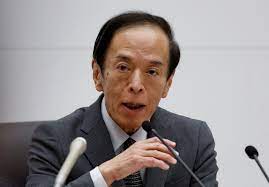NAGOYA (Reuters): Bank of Japan Governor Kazuo Ueda said the country was making progress towards achieving the bank’s 2 per cent target but not enough to end ultra-loose monetary policy just yet, warning of uncertainty on whether companies will keep rising wages enough next year.
The key considerations to whether Japan can sustainably achieve 2pc inflation is whether wages will keep rising next year and whether companies will start hiking prices on expectations that labour costs will continue to increase, he said.
“We’re seeing more positive signs than before in corporate wage and price-setting behaviour. But there’s still uncertainty on whether the positive cycle (of inflation and wages) will strengthen, as we predict,” Ueda said in a speech to business leaders in Nagoya, central Japan, on Monday.
Japan’s economy is likely to continue recovering, but the outlook was “extremely uncertain” due largely to overseas risks such as the impact of aggressive US interest rate hikes on financial markets, and China’s weak growth momentum, he said.
Ueda said the BOJ was focusing on inflation-adjusted real borrowing costs, which remained in negative territory even as bond yields crept up.
“Inflation expectations have heightened moderately since last year. As such, real interest rates stayed in negative territory even as long-term rates rose,” Ueda said.
“We expect real interest rates to move in negative territory and keep monetary conditions sufficiently accommodative,” he said, signalling that the BOJ will tolerate a moderate rise in government bond yields.
The central bank maintained its ultra-easy monetary settings last week but further loosened its grip on long-term rates by tweaking its bond yield control policy, taking another step towards dismantling its controversial stimulus programme.
The BOJ remains a dovish outlier amid a global wave of aggressive policy tightening by central banks on the view the recent cost-push inflation must be replaced by a largely demand-driven price rise before it can phase out stimulus.
But with inflation exceeding its 2pc target for more than a year, sources have told Reuters the BOJ likely has its eyes set to end its yield control policy and pull short-term rates out of negative territory next year.
The central bank’s decision last week to tweak its yield curve control (YCC) policy underscored the challenge it faces in keeping a tight grip on long-term yields in the face of growing inflationary pressure and rising global yields, analysts say.
Minutes of the BOJ’s meeting in September showed that the nine-member board was already discussing how best to communicate the path towards an exit from ultra-loose policy.
While the board agreed the BOJ could not predict now when it may exit its accommodative settings, one member said the bank must ensure its communication does not bind too much the timing and order of future policy changes, the minutes showed.
One member also said the BOJ must lay the groundwork for a future exit such as through its communication with markets and the broader public, according to the minutes.







